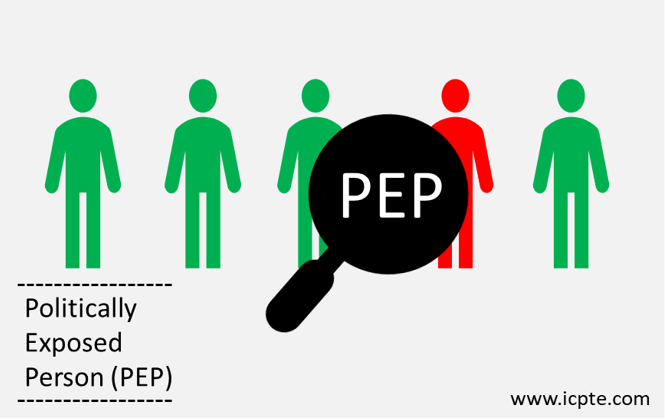The Institute of Continuous Professional Training and Education (ICPTE) offers an extensive variety of Pre-Recorded and Live Online Courses created by Professional and qualified Instructors with years of experience in their field.
ICPTE platform allows You the flexibility to watch online pre-recorded seminars at Your own convenience, at Your own pace, in Your own time and place. Start watching a seminar today and complete it at Your own time. You can have access from anywhere. We work with professional and qualified instructors with years of experience in their field.
Politically Exposed Person (PEP) means a natural person who is or who has been entrusted with prominent public functions, an immediate close relative of such person as well as a person known to be a close associate of such person:
‘Prominent public function’ means any of the following public functions:
- heads of State, heads of government, ministers and deputy or assistant ministers
- members of parliaments or of similar legislative bodies;
- members of the governing bodies of political parties;
- members of supreme courts, of constitutional courts or of other high-level judicial bodies, the decisions of which are not subject to further appeal, except in exceptional circumstances;
- members of courts of auditors or of the boards of central banks;
- ambassadors, chargés d’affaires and high-ranking officers in the armed forces;
- members of the administrative, management or supervisory bodies of State-owned enterprises
- directors, deputy directors and members of the board or equivalent function of an international organisation;
- mayor.
No public functions referred to in above points shall be understood as covering middle ranking or more junior officials.
‘Close relatives of a politically exposed person’ includes the following:
- the spouse, or a person considered to be equivalent to a spouse, of a politically exposed person;
- the children and their spouses, or persons considered to be equivalent to a spouse, of a politically exposed person;
- the parents of a politically exposed person;
‘Persons known to be close associates of a politically exposed person’ means natural person:
- who is known to have joint beneficial ownership of legal entities or legal arrangements, or any other close business relations, with a politically exposed person;
- who has sole beneficial ownership of a legal entity or legal arrangement which is known to have been set up for the de facto benefit of a politically exposed person.
Provided that, where a politically exposed person is no longer entrusted with a prominent public function by a member state or a third country, or with a prominent public function by an international organisation, for at least 12 months, the Company shall not be obliged to consider such a person as politically exposed person.
In cases where the Beneficial Owner of a client is a PEP or where a PEP exercises control over the client, firms should by default treat the client as high risk from a money laundering and terrorist financing perspective. All firms must ensure the above is clearly accounted for in their risk management policy. In such cases, Enhanced Due Diligence measures should apply.
A PEP generally is perceived to present a higher risk for potential involvement in bribery and corruption by virtue of their position and the influence they may hold. This influence is also considered to have an effect on the risk profile of their close family members and associates. Close family members and associates of PEPs should also be treated as high risk.
Firms should put in place appropriate risk management systems and risk-based procedures to determine whether a potential client and/or beneficial owner, an existing client and/or the beneficial owner is a PEP. Firms should take reasonable measures to identify any trustee, settlor, beneficial owner or natural person exercising effective control in relation to a trust, company or other legal persons whether they are a PEP or a family member or close associate of a PEP.
Such measures and procedures may include, depending on the degree of risk, the acquisition and installation of a reliable commercial electronic database for politically exposed persons, seeking and obtaining relevant information from the customer himself or from publicly available information.
Firms that use commercially available PEP lists should ensure that information on these lists is up to date and that they understand the limitations of those lists. Firms should take additional measures where necessary, for example in situations where the screening results are inconclusive or not in line with the firm’s expectations.
In the case of legal entities and arrangements, the procedures aim at verifying whether the beneficial owners, authorised signatories and persons authorised to act on behalf of the legal entities and arrangements constitute politically exposed persons. In case of identifying one of the above as a politically exposed person, then automatically the account of the legal entity or arrangement should be subject to the relevant procedures for PEPs.
More attention should be paid when the PEPs are connected (nationality, residency, citizenship or location of business activity) with a country which is widely known to face problems of bribery, corruption and financial irregularity and whose laws and regulations for the prevention of money laundering and terrorist financing are not equivalent with international standards.
Where a business relationship with a PEP related client including family and close associates of a PEP is established, the firm should apply the following specific EDD measures:
a) Senior management officials approval for establishing a business relationship or for the continuation of business relationships with an existing client which has become a PEP. The decision is then forwarded to the compliance officer.
b) Create the economic profile of the customer. The details of the expected business and nature of activities of the customer forms the basis for the future monitoring of the account. The profile should be regularly reviewed and updated with new data and information. The Company should be particularly cautious and most vigilant where its customers are involved in businesses which appear to be most vulnerable to corruption such as trading in oil, arms, cigarettes and alcoholic drinks.
c) Take adequate measures to establish the size and source of wealth and source of funds that are involved in business relationships or transactions with such a person in order to allow the Company to satisfy itself that it does not handle the proceeds from corruption or other criminal activity. The measures the Company shall take to establish the PEP’s source of wealth and the source of funds will depend on the degree of high risk associated with the business relationship. The Company shall verify the source of wealth and the source of funds on the basis of reliable and independent data, documents or information where the risk associated with the PEP relationship is particularly high.
d) Take reasonable measures to establish the source of wealth and source of funds in relation to the settlor, beneficiaries who receive distributions, or natural persons exercising effective control over a trust or beneficial owners or natural persons exercising effective control over a legal entity or other arrangement identified as PEPs
e) Conduct enhanced on-going monitoring of the business relationship. The Company shall apply enhanced ongoing monitoring of both transactions and the risk associated with the business relationship. The Company shall identify unusual transactions and regularly review the information it hold to ensure that any new or emerging information that could affect the risk assessment is identified in a timely fashion. The frequency of ongoing monitoring should be determined by the level of high risk associated with the relationship.
f) The account should be subject to annual review in order to determine whether to allow its continuance of operation. A short report should be prepared summarising the results of the review by the person who is in charge of monitoring the account. The report is submitted for consideration and approval to the board of directors and filed in the customer’s personal file.
g) Perform background checks (screening)
The above EDD measures may also be adopted for various high-risk clients other than PEPs.
Relevant factors that will influence the extent and nature of CDD include the particular circumstances of a PEP, whether the PEP has access to official funds, the PEP’s home country, the type of work the PEP is instructing the Firm to perform or carry out (i.e. the services that are being asked for), whether the PEP is domestically based or international, particularly having regard to the services asked for, and the scrutiny to which the PEP is under in the PEP’s home country.
The nature of the risk should be considered in light of all relevant circumstances, such as:
a) The nature of the relationship between the client and the PEP. If the client is a trust, company or legal entity, even if the PEP is not a natural person exercising effective control or the PEP is merely a discretionary beneficiary who has not received any distributions, the PEP may nonetheless affect the risk assessment.
b) The nature of the client (e.g. where it is a public listed company or regulated entity which is subject to and regulated for a full range of AML/CFT requirements consistent with FATF recommendations, the fact that it is subject to reporting obligations will be a relevant factor, albeit this should not automatically qualify the client for simplified CDD).
c) The nature of the services sought. For example, lower risks may exist where a PEP is not the client but a director of a client that is a public listed company or regulated entity and the client is purchasing property for adequate consideration.
Firms should continue treating natural persons as PEPs, after they cease to hold a prominent public function, for a period of at least 12 months. Firms should continue applying EDD measures to PEPs for more than 12 months after they have ceased to hold a prominent public function, when assessing that they present a higher risk for money laundering and terrorist financing, due to any significant influence they may still have. The above provisions apply also for family members and persons that are known to be close associates of PEPs.
Click HERE to find online seminars on Anti Money Laundering topics


